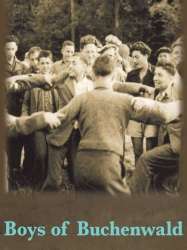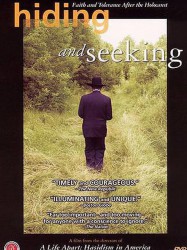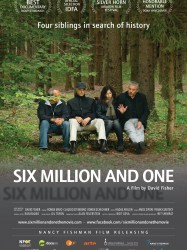Between Hitler and Stalin est un film
Between Hitler and Stalin (2003)

Si vous aimez ce film, faites-le savoir !
Durée 1h
Between Hitler and Stalin: Ukraine in World War II is a 2003 film produced and directed by Slavko Nowytski and narrated by Jack Palance. The one-hour documentary, part black-and-white and part color, is a project of Ukrainian Canadian Research and Documentation Centre - an attempt to tell the story of the Second World War from a Ukrainian perspective.
In a chonological manner, Nowytski's film unfolds during the years of Soviet-Nazi collaboration recounting the losses and suffering of the Ukrainian people; the documentary shifts to the destruction wrought by Joseph Stalin's scorched earth policy as the Soviet Union military retreated, and shows the ruins left behind by the German and then the Soviet offensives.
[...]Voir plus...
Commentaires
Postez un commentaire :
Suggestions de films similaires à Between Hitler and Stalin
Il y a 10575 films qui ont les mêmes thèmes (dont 65 films qui ont les mêmes 8 thèmes que Between Hitler and Stalin), pour avoir au final 70 suggestions de films similaires.Si vous avez aimé Between Hitler and Stalin, vous aimerez sûrement les films similaires suivants :

The Nazi Plan (1945)
Réalisé par George Stevens
Origine Etats-Unis
Genres Documentaire
Thèmes Le racisme, Religion, Documentaire sur la discrimination, Documentaire sur le droit, Documentaire sur la guerre, Documentaire historique, Documentaire sur une personnalité, Documentaire sur la religion, Politique, Religion juive, Documentaire sur la Seconde Guerre mondiale
Note67%





The film's central footage and themes "relied heavily" on the work of German film maker Leni Riefenstahl, in particular the 1935 movie Triumph des Willens (Triumph of the Will).

They Were Not Silent (1997)
, 30minutesGenres Documentaire
Thèmes Le racisme, Religion, Le monde du travail, Documentaire sur la discrimination, Documentaire sur le droit, Documentaire sur la guerre, Documentaire historique, Documentaire sur une personnalité, Documentaire sur la politique, Documentaire sur la religion, Politique, Religion juive, Documentaire sur la Seconde Guerre mondiale

The Boys of Buchenwald (2002)
, 47minutesOrigine Canada
Thèmes Le racisme, Religion, Documentaire sur la discrimination, Documentaire sur le droit, Documentaire sur la guerre, Documentaire historique, Documentaire sur une personnalité, Documentaire sur la religion, Politique, Religion juive, Documentaire sur la Seconde Guerre mondiale
Note60%





Over four hundred orphans from Buchenwald were sent to an orphanage in France where they were educated and cared for. The documentary follows the orphans, who are now old men, as they reunite on the 55th anniversary of the liberation of Buchenwald by the American army.

Hiding and Seeking (2004)
Genres Documentaire
Thèmes Le racisme, Religion, Documentaire sur la discrimination, Documentaire sur le droit, Documentaire sur la guerre, Documentaire historique, Documentaire sur une personnalité, Documentaire sur la religion, Politique, Religion juive, Documentaire sur la Seconde Guerre mondiale
Note77%






Goodbye Holland (2004)
, 1h30Réalisé par Willy Lindwer
Genres Documentaire
Thèmes Le racisme, Religion, Documentaire sur la discrimination, Documentaire sur le droit, Documentaire sur la guerre, Documentaire historique, Documentaire sur une personnalité, Documentaire sur la religion, Politique, Religion juive, Documentaire sur la Seconde Guerre mondiale

L'Œil de Vichy (1993)
, 1h50Réalisé par Claude Chabrol
Origine France
Genres Documentaire
Thèmes Film traitant du cinéma, Le racisme, Religion, Documentaire sur le monde des affaires, Documentaire sur le cinéma, Documentaire sur la discrimination, Documentaire sur le droit, Documentaire sur la guerre, Documentaire historique, Documentaire sur une personnalité, Documentaire sur la religion, Politique, Religion juive, Documentaire sur la Seconde Guerre mondiale, Documentaire sur les films, Histoire de France, L'Occupation allemande en France
Acteurs Michel Bouquet, Brian Cox
Note71%





Le film propose une sélection des actualités du régime de Vichy (d'août 1940 à août 1944) montée de manière chronologique. Aucun commentaire ne les accompagne. Le film « n'en a pas besoin », comme l'a expliqué Chabrol lors de la présentation de son travail.

Reshimat Ahava (2000)
, 1h30Genres Documentaire
Thèmes La famille, Le racisme, Religion, Documentaire sur la discrimination, Documentaire sur le droit, Documentaire sur la guerre, Documentaire historique, Documentaire sur une personnalité, Documentaire sur la religion, Politique, Religion juive, Documentaire sur la Seconde Guerre mondiale
Note69%





After the death of their parents, Filmmaker David Fisher feels that his family has grown apart and that his siblings are focused on their careers and relationships with their spouses and children. Fisher believes that a search for their sister, who was allegedly taken from their parents at birth, will help them bond.
 , 1h4
, 1h4Réalisé par Matej Mináč
Genres Documentaire, Historique
Thèmes Le racisme, Religion, Documentaire sur la discrimination, Documentaire sur le droit, Documentaire sur la guerre, Documentaire historique, Documentaire sur une personnalité, Documentaire sur la religion, Politique, Religion juive, Documentaire sur la Seconde Guerre mondiale
Acteurs Karel Reisz
Note81%





Partez à la rencontre de Nicholas Winton, véritable héros d'avant-guerre. Jamais considéré comme tel, cet homme a pourtant sauvé 669 enfants à la veille de la Seconde Guerre mondiale. Dans la capitale tchécoslovaque, alors qu´il se préparait pour des vacances au ski, le jeune Nicholas Winton va organiser une extraordinaire opération de sauvetage d'enfants juifs menacés par les nazis.

The Short Life of Anne Frank (2001)
Genres Documentaire
Thèmes L'enfance, Le racisme, Religion, Documentaire sur la discrimination, Documentaire sur le droit, Documentaire sur la guerre, Documentaire historique, Documentaire sur une personnalité, Documentaire sur la religion, Politique, Religion juive, Documentaire sur la Seconde Guerre mondiale
Acteurs Thekla Reuten, Joachim Król, Bram Bart, Jeremy Irons
Note76%






Six Million and One (2012)
, 1h33Genres Documentaire
Thèmes Le racisme, Religion, Documentaire sur la discrimination, Documentaire sur le droit, Documentaire sur la guerre, Documentaire historique, Documentaire sur une personnalité, Documentaire sur la religion, Politique, Religion juive, Documentaire sur la Seconde Guerre mondiale
Note66%





Joseph Fischer's memoir was discovered only after his death. His children refused to confront it, except for David, the filmmaker, for whom it became a compass for a long journey. When David found it unbearable to be alone in the wake of his father's survival story and in his struggle not to lose his sanity, he convinced his brothers and sister to join him in the hope that this would also contribute to releasing tensions and bring them as close as they used to be. His siblings, for their part, couldn’t understand why anyone should want to dig into the past instead of enjoying life in the present.
[...]Voir plus...
 Connexion
Connexion